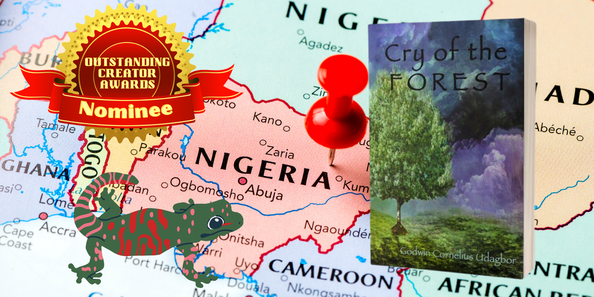|
Score: 87/100 (8.7 out of 10)
Well, this is quite a fun little story by international author Godwin-Cornelius Udagbor of Nigeria! This book involves the power of storytelling in preserving indigenous culture as well as the tug-o-war between the old and the new. Baba (“father”), a village elder and ex-soldier, tells the mythological story of Ochagbe, a land in Nigeria, where the people had accidentally taken in and adopted the malevolent god of death, Okah. Okah was originally brought in to solve a critical problem in the land, but instead the deity demanded human sacrifices, something which grew out of control and angered the population. A powerful priest named Abokpe then offended Okah by failing to supply sacrifices and festivities in time, thus starving him of his food. In retaliation, Okah brought a famine upon the land, and to appease him and save his people, Abokpe was given the unenviable task of choosing to sacrifice one of his three sons: Ireritem, Ogbor, or Odey. This story is played side-by-side with the stories shared by missionaries about their “big God” or “Osobuchi” and a new way of viewing cosmology and the sanctity of human life. While we wish that we were given more time to learn about these characters in-depth and as individuals, the story is still interesting and captivating. One of the best things about this little book is that we really get to know Ochagbe—the people, the culture, the food, the places therein, and more. It's so interesting and fresh! We rarely get to see and read about another culture like this. The influence of the western missionaries and their beliefs and insights cut in and out as they not only share western religion with the Uchagbe people but also knowledge about things like sickle cell anemia, a likely explanation for miscarriages among the women. The only really negatives things we can say about this awesome book is that it's so short, and thus characters don't get developed as much as they could. This book could've used an extra few chapters to flesh out interesting characters like Ojata, the village comedian. It also ends rather abruptly. We think we can guess why this was done: because it would cost an arm and a leg to translate a longer book into so many languages. Still, this little book is a worthwhile read! It is available in many languages from the author's site!
0 Comments
Leave a Reply. |
Archives
July 2024
Categories |

 RSS Feed
RSS Feed